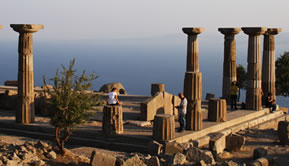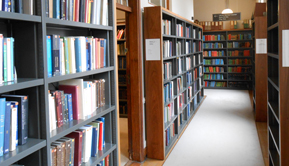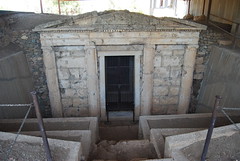Caroline Mackenzie meets Caroline Lawrence to discuss the challenges of writing about the ancient world for children – and of ‘finding’ Socrates
Could you begin by telling me a little about your background?
I was born in London to American parents. A year after I was born, my parents returned to California. My mother was an artist and my father taught French and drama at middle school. The seeds of my love for Classics were gently sown as I pored over mythological paintings and Greek art in my mother’s art books. And when we all went to see A Funny Thing Happened on the Way to the Forum at a drive-in cinema. And when my parents sent me to Europe on a summer study tour and I spent a magical afternoon in Ostia Antica. But my coup de foudre occurred when I read Mary Renault’s book The Last of the Wine, an historical novel set in the time of Plato, Socrates and Xenophon. I was in Switzerland on my gap year, and read it along with the Iliad in translation. As soon as I got back, I rushed to sign up for Ancient Greek at U.C. Berkeley and fell totally in love with Classics. After Berkeley, I managed to win a scholarship to Newnham College, Cambridge where I studied Classical Art and Archaeology. I found Cambridge too academic and took a few years off to get married and have a son. I remained in England, and later took an MA in Hebrew and Jewish Studies at University College, London. I then taught Latin, French and art at my son’s primary school, first as a parent just helping out, later as a paid teacher.
When did your writing career start and how you did you get into writing in your particular genre?
I began to research writing for screenplays and I intended writing a script about a Jewish slave-girl in Pompeii. I was telling my sister about this while visiting her in California and she suggested that instead I write a book for kids, set in Pompeii. I then had the idea to make the story about a girl detective a bit like the Nancy Drew mystery stories which I had read as a little girl. Only my girl detective would live in first-century Rome. Back in London, I wrote it during the last two weeks of the summer holidays. That became my first book, The Thieves of Ostia, which was published in 2001. It was to become the first of a 17-book series called The Roman Mysteries.
What fascinates you about the ancient world?
My main motivating factor is to solve the mystery of what life really would have been like back then. I am fascinated by the tension of how like us they were and how unlike us they were. Even now, whenever I think I’m beginning to understand the past, I read or see something that makes me realise how little I really know.
Why do you think the ancient world strikes such a chord with both children and adults today?
The ancient world is like a country you’re not allowed to visit; you only hear tales about it. So, in the absence of a Time Machine, you seek out the most convincing accounts and depictions in literature, film, re-enactment and even computer games. I believe everyone likes being transported to another world.
Are children more discerning readers than adults?
I wouldn’t say children are more discerning, but I believe they are more demanding. If they get to a boring bit they are liable to toss the book aside. But that’s also why I prefer children’s fiction: the plots are usually much faster moving and almost always more uplifting.
How does writing about (and researching) ancient Greece compare to ancient Rome and what are the different challenges?
Somehow ancient Greece has always felt more remote to me than ancient Rome, and not just because it happened longer ago. One reason is that women had very little place in ancient Greece...or perhaps I should say ancient Athens, which gave us most of the literature. Another reason is that Greek literature seems to me to deal more with abstract concepts: Plato’s forms, the myths about the gods and the almost operatic extremes of Athenian tragedy all seem like ideas rather than history. I used to think that Latin literature was more firmly grounded in the concrete sensory world. However, now that I’m delving more deeply into Plato and Aristophanes I’m finding some nice concrete material in Greek literature.
Your Roman Mysteries books cleverly introduce Latin words throughout the text which gives the stories great didactic value. Can we look forward to some ancient Greek in your new book?
Definitely! I have introduced it by transliterating the Greek words. My favourite one is the expression ‘nay ton koonay’ which translates literally as ‘By the dog!’, an amusing version of ‘By Zeus!’ or ‘By God!’. It was an expression Socrates used sometimes, according to Plato.
How was your recent research trip to Athens? What was the most surprising/unexpected part of the experience?
One of the things that surprised me about Athens was music. It was everywhere! Outside the Acropolis Museum I listened to a couple of students playing buzzy ancient flutes called diauloi. I heard five men playing bouzouki outside Monastiraki metro and later an electric base player. An old man played santouri near my hotel. And at a taverna near the Agora, I was serenaded over lunch by a delightful bouzouki and guitar duo. Upstairs at the new Kotsanas Museum of Ancient Greek Technology in the posh Kolonaki part of Athens, I found a reconstruction of every musical instrument you can think of, including a few that were for sale. I even heard the alarm clock that Plato supposedly invented, a water-operated warbling bird whistle.
You have been diligently researching Socrates through Plato. Were the archaeological sources as important as the literary sources?
For my last book based on the Mithraeum and the remains of a girl from third-century Roman London, I had lots of archaeology to inform the story. This one was much harder. I tried reading Plato’s Apology in ancient Greek but got bogged down in the grammar. My breakthrough came when I started listening to Plato’s dialogues in audio version. Suddenly the ‘archaeological’ bits, the concrete elements if you will, started jumping out at me.
Can you give me any examples?
Many of Plato’s dialogues are set in specific parts of Athens. At the beginning of the dialogue called Phaedrus, Socrates and Phaedrus walk outside the city walls by the Ilissos River and stop on a grassy spot underneath a spreading plane tree. In the Protagoras (314c), a eunuch doorkeeper refuses Socrates and his friend entry, mistaking them for sophists. And the dialogue called Euthyphro finds Socrates on a step of the Royal Stoa. While in Athens I met a tour guide and scholar named George Kokkos who pointed out the exact point where Socrates stood.
But my favourite literary artefact is one I have never seen in any museum. In the Symposium (215b), Alcibiades likens Socrates to certain Silenus-figures that apparently sat in statue-makers’ shops. These carved figures were shown holding pipes or flutes in their hands. They were made in two halves and when you opened them up, they were found to contain images of a god, Apollo or Dionysus, I’m presuming. A wooden Silenus based on this description will feature prominently in my book.
One of the great qualities of your writing is the use of sensory experiences - which Athenian/Greek smells, sights and sounds inspired you the most?Modern Athens is too far removed from ancient Athens but I had a moment in the Parthenon car park when I saw modern Greek taxi drivers standing around in groups and imagined them wearing ancient garb, mantles, sandals, walking sticks... I was helped in this imaginative exercise when a tanned, oiled and nearly-naked jogger wove through groups of tourists. He looked like an Olympic athlete, and he knew it!
My afternoon wandering around the ancient Agora was probably my best few hours. Back in the 1950’s this ancient marketplace was cleared of houses and then excavated by the American School at Athens. They reconstructed a stoa (a long building with columns for shops) which now houses the small collection of the Agora Museum. They also planted the ruins with period flora which have grown lush in the past seventy years. I spotted red poppies, mauve mallow as well as pink and white oleander. I watched a line of diligent ants, saw butterflies flutter by and stalked one of the famous agora tortoises. Myrtle, pine, oak and laurel trees were filled with the twitter of birds. Chattering magpies were highly visible but wood pigeons cooed unseen. I rediscovered the relief of moving from blazing sun into a pool of shade and of giving aching feet a rest. When I found the site of the prison where Socrates spent the last month of his life I sat by the Great Drain in the shade of an almond tree and meditated on his life and death.
Where would you time travel to personally?
I’d like to go back to Alexandria in the time of Cleopatra, to Jerusalem in the time of Jesus and to Pergamum in the time of the physician Galen.
Last but not least, what (else) can you tell us about your much-anticipated new book?
I wrote it in order to try to understand why Socrates – an odd, barefoot, satyr-looking Athenian who never wrote a word – ended up as one of the most influential figures in Western culture. As Plato has a character say in the Symposium (221c): ‘Many are the marvels which I might narrate in praise of Socrates; Most of his ways might perhaps be paralleled in another man, but his absolute unlikeness to any human being that is or ever has been is perfectly astonishing.’ [Translation by Benjamin Jowett.]
I think I’ve finally ‘got’ Socrates, or at least found a version of him that makes sense... Whether I can convince ten-year-old kids of his fascination and achievement is another matter!
Caroline Lawrence’s new book, The Time Travel Dialogues, will be published by Piccadilly Press in 2020.
www.carolinelawrence.com









